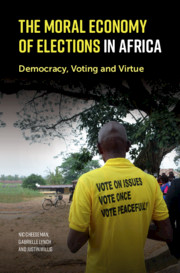Crossref Citations
This Book has been
cited by the following publications. This list is generated based on data provided by Crossref.
Willis, Justin
Cheeseman, Nic
and
Lynch, Gabrielle
2021.
The history of elections in Ghana, Kenya and Uganda. What We Can Learn from These ‘National Exercises’.
Journal of African Elections,
Vol. 20,
Issue. 2,
p.
1.
Siachiwena, Hangala
2022.
The urban vote in Zambia’s 2021 elections: popular attitudes towards the economy in Copperbelt and Lusaka.
Journal of Eastern African Studies,
Vol. 16,
Issue. 4,
p.
600.
Abdulahi, Hamdi I
2022.
Elections and Electoral Processes in Somaliland: A Fading Democracy.
Journal of African Elections,
Vol. 21,
Issue. 2,
p.
76.
Fowler, Alan
2022.
Civil Society and the Pluralization of African Philanthropy: A Case of Back to the Future?.
Nonprofit and Voluntary Sector Quarterly,
Vol. 51,
Issue. 1,
p.
103.
Kaaba, O’Brien
Hinfelaar, Marja
and
Sawyer, Koffi
2022.
A comparison of the role of domestic and international election observers in Zambia’s 2016 and 2021 general elections.
Journal of Eastern African Studies,
Vol. 16,
Issue. 4,
p.
643.
Kontinen, Tiina
and
Holma, Katariina
2022.
Learning, Philosophy, and African Citizenship.
p.
17.
Nyandoro, Mark
2022.
Zimbabwe’s port-2000 elections: more hotly contested yet less democratic than in the past.
Journal of African Elections,
Vol. 21,
Issue. 1,
p.
70.
Cheeseman, Nic
2022.
(Mis)Understanding Urban Africa: Toward A Research Agenda on the Political Impact of Urbanization.
African Studies Review,
Vol. 65,
Issue. 4,
p.
985.
Saidou, Abdoul Karim
and
Bertrand, Eloïse
2022.
Security as a campaign issue: programmatic mobilization in Burkina Faso’s 2020 elections.
Democratization,
Vol. 29,
Issue. 8,
p.
1436.
Paget, Dan
Beardsworth, Nicole
and
Lynch, Gabrielle
2023.
Campaign rallies and political meaning-making.
Commonwealth & Comparative Politics,
Vol. 61,
Issue. 3,
p.
235.
Macdonald, Robert
and
Molony, Thomas
2023.
Can domestic observers serve as impartial arbiters?: evidence from Zambia’s 2021 elections.
Democratization,
Vol. 30,
Issue. 4,
p.
635.
Amutabi, Maurice N.
and
Hamasi, Linnet
2023.
The Palgrave Handbook of Contemporary Kenya.
p.
71.
Agboga, Victor
2023.
How do voters respond to party switching in Africa?.
Democratization,
Vol. 30,
Issue. 7,
p.
1335.
Ssentongo, Jimmy Spire
and
Alava, Henni
2023.
Citizenship moods in the late Museveni era: a cartoon-powered analysis.
Journal of Eastern African Studies,
Vol. 17,
Issue. 1-2,
p.
301.
Waddilove, Hannah
2023.
‘A show of numbers’: campaign rallies and performing elite alliance-building in Kenya.
Commonwealth & Comparative Politics,
Vol. 61,
Issue. 3,
p.
315.
Jung, Danielle F.
and
Long, James D.
2023.
The Social Origins of Electoral Participation in Emerging Democracies.
Braun, Michael J.
2024.
‘Thin’ loyalty and declining attachment to the African National Congress.
Commonwealth & Comparative Politics,
Vol. 62,
Issue. 1,
p.
25.
Agboga, Victor
2024.
Testing political loyalties in Nigeria: what factors influence support for party switchers?.
The Round Table,
Vol. 113,
Issue. 2,
p.
117.
Kerr, Nicholas
2024.
Electoral Commissions and Democratization in Africa.
Lynch, Gabrielle
2024.
Driving together: Shared car journeys as research space.
Qualitative Research,



